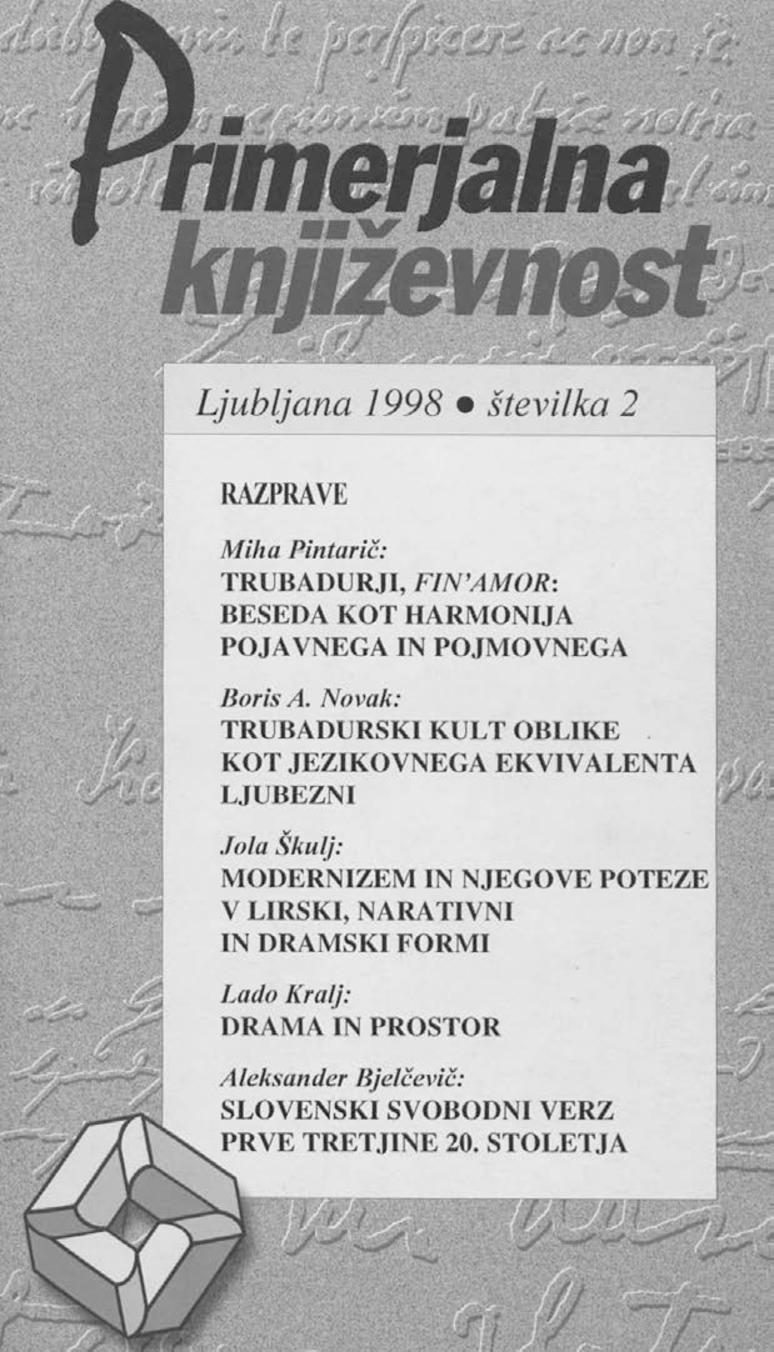Drama and Space
Keywords:
literary theory, drama theory, dramatic structure, dramatic space, literary spaces, theatre studies, theatre spaceAbstract
The paper advocates the thesis that every historical convention of stage space reflectively affects the dramatic writing. In other words: a dramatist usually writes under the strong influence of the general staging concept, as he sees it in the theatre of his days. Historically, the illusionist convention is predominant over the simultaneous, Elizabethan, abstract, play-within-a-play and epic ones. The illusionist convention, which reached its peak at the end of the nineteenth century, is based on the contradictory belief that theatre needs to show the truth, and this can be achieved with the help of illusion, i.e. a deceptive technique of showing merely imaginary characters, actions and places as though they were real. In this way, Aristotle's notion of probability was reinterpreted from causality into verism, and the reason for this process lies in the visual aspect of drama; Aristotle noticed the appealing effect of visuality, but he could not predict its later expansion. The simultaneous convention is an entirely different notion of space, typical of dramas written in the Middle Ages. It has no need of any illusion of reality, as its world is allegorical. A drama written for a simultaneous stage has the so-called implicit staging directions, which also occur in Elizabethian plays. They describe the scene by not being located in the secondary, but in the main text (dialogue) and therefore they anticipate the localization of a fictitious space in the realm of the spectator's mind. One form of implicit stage direction is the so-called teichoscopia (a view from a wall) where a character looks outside the stage to a location which is not visible to the spectator, and describes the events taking place there. How much a dramatist was obliged to follow the stage convention of his days is also shown in the strict classicist rule of unity of place, which is mainly for one purpose: to protect the illusion of reality, since a change of place might actually destroy it.References
ARISTOTEL (1982). Poetika. Ljubljana: Cankarjeva založba.
BOILEAU (1961). »L’Art Poétique«, v: Boileau. Œuvres. Pariz: Classiques Garnier. Izvirnik: 1674.
CASTELVETRO, Lodovico (1978). Poetica d’Aristotele vulgarizzata e sposta, I. Ur. W. Romani. Rim, Bari. Izvirnik: 1570.
CAWLEY, A. C., ur. (1961). Everyman. Manchester: Manchester University Press.
CORNEILLE, Pierre (1957). »Discours de trois unités d’action, de jour, et de lieu«, v: Pierre Corneille. Théâtre complèt, I. Pariz: Bibliothèque de la Pléade, 19. Izvirnik: 1660.
CRAIG, Edward Gordon (1995). O gledališki umetnosti. Ljubljana: Knjižnica MGL, 120. Izvirnik: On the Art of the Theatre, 1911.
CRAIG, Hardin (1955). English Religious Drama of the Middle Ages. Oxford: Clarendon Press.
DEAK, Frantisek (1993). Symbolist Theater. The Formation of an Avant–garde. Baltimore, London: The John Hopkins University Press.
INGARDEN, Roman (1990). Literarna umetnina. Ljubljana: ŠKUC in Filozofska fakulteta. Izvirnik: Das literarische Kunstwerk, 1931.
JOHNSON, Samuel (1994). »From the Preface to Shakespeare«, v: Michael J. Sidnell, ur. Sources of Dramatic Theor<, II. Cambridge: Cambridge University Press, 77–87. Izvirnik: 1765.
KLAIĆ, Dragan, ur. (1988). Pozorište i drame srednjeg veka. Novi Sad: Književna zajednica Novog Sada.
LESSING, Gotthold Ephraim (1872). »Briefe, die neueste Literatur betreffend«, v: Gotthold Ephraim Lessing. Lessing’s Werke, IX. Berlin: Gustav Hempel, 33–351. Izvirnik: 1759.
MILLS, David (1995). »The Theaters of Everyman«, v: John A. Alford, ur. From Page to Performance. Essays in Early English Drama. East Lansing: Michigan State University Press, 127–149.
MIOČINOVIĆ, Mirjana (1976). Surovo pozorište. Beograd: Prosveta.
NICOLL, Allardyce (1988). »Srednjevekovne pozornice«, v: Dragan Klaić, ur. Nav. d., 1988, 292–298.
PFISTER, Manfred (1988). Das Drama. Theorie und Analyse. München: Fink.
SZONDI, Peter (1963). Theorie des modernen Dramas. Frankfurt: Suhrkamp.
TAINE, Hippolyte (1954). »Uvod u historiju engleske književnosti«, v: Hippolyte Taine. Študije i eseji. Beograd: Kultura, 31–55. Izvirnik: Histoire de la littérature anglaise, I, 1864.
UBERSFELD, Anne (1987): »Pédagogie dufait théâtral«, v: André Helbo, J. Dines Johansen itd., ur. Théâtre. Modes d’approche. Bruselj: Editions Labor. 169–201.
--- (1996): Lire le théâtre, I. Pariz: Belin. Izvirnik: 1978.
WILLIAMS, Raymond (1968). Drama in Perfomiance. Harmondsworth: Penguin.
ZOLA, Émile (1968): Œuvres complètes, X–XI. Pariz: Cercle du livre précieux.


